Thursday, April 4, 2024. Annette’s News Roundup.
I think the Roundup makes people feel not so alone.
To read an article excerpted in this Roundup, click on its blue title. Each “blue” article is hyperlinked so you can read the whole article.
Please feel free to share.
Invite at least one other person to subscribe today! https://buttondown.email/AnnettesNewsRoundup
____________________________________________
Joe is always busy.
Trump said he would make a statement about abortion next week.
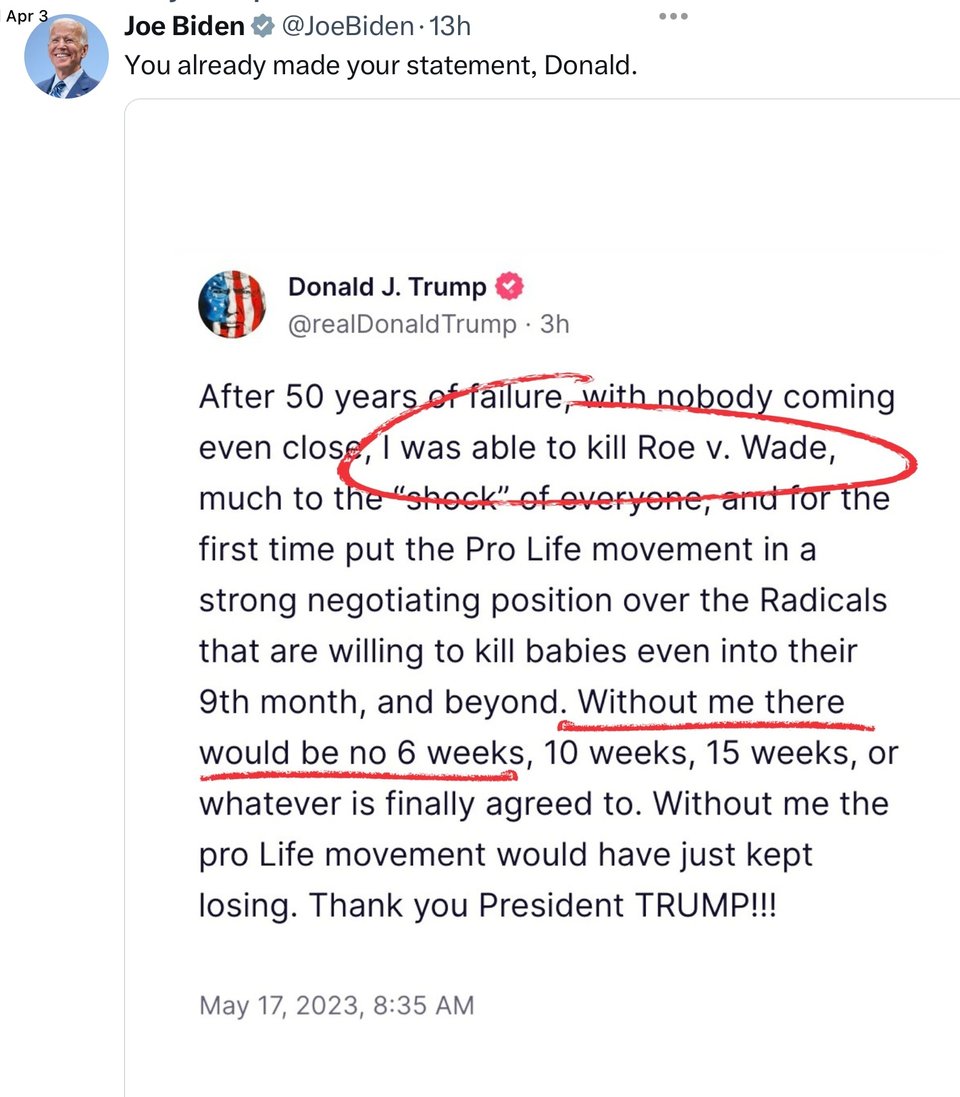
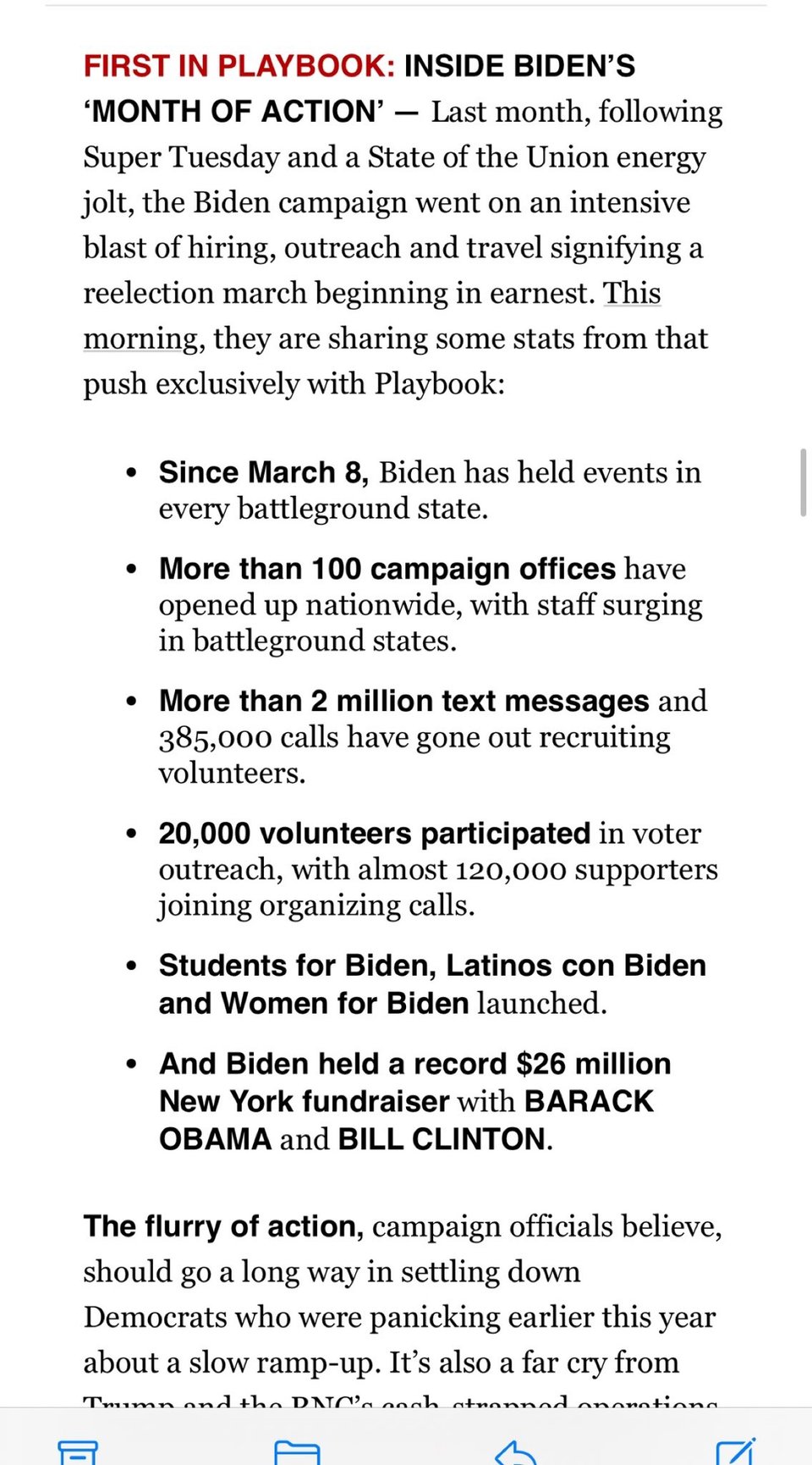

NEW: Biden will speak to Netanyahu tomorrow. This will be the first time they've spoken since the IDF airstrike that killed workers from World Central Kitchen, and since the Biden administration allowed for a UN resolution for a permanent ceasefire to pass.
__________________________________________
Pay Attention ! or the GOP May Find Other Obscure Laws to Hurt Us.
I Hope to Repeal an Arcane Law That Could Be Misused to Ban Abortion Nationwide. By Tina Smith
Ms. Smith is a Democratic senator from Minnesota and a former Planned Parenthood executive.
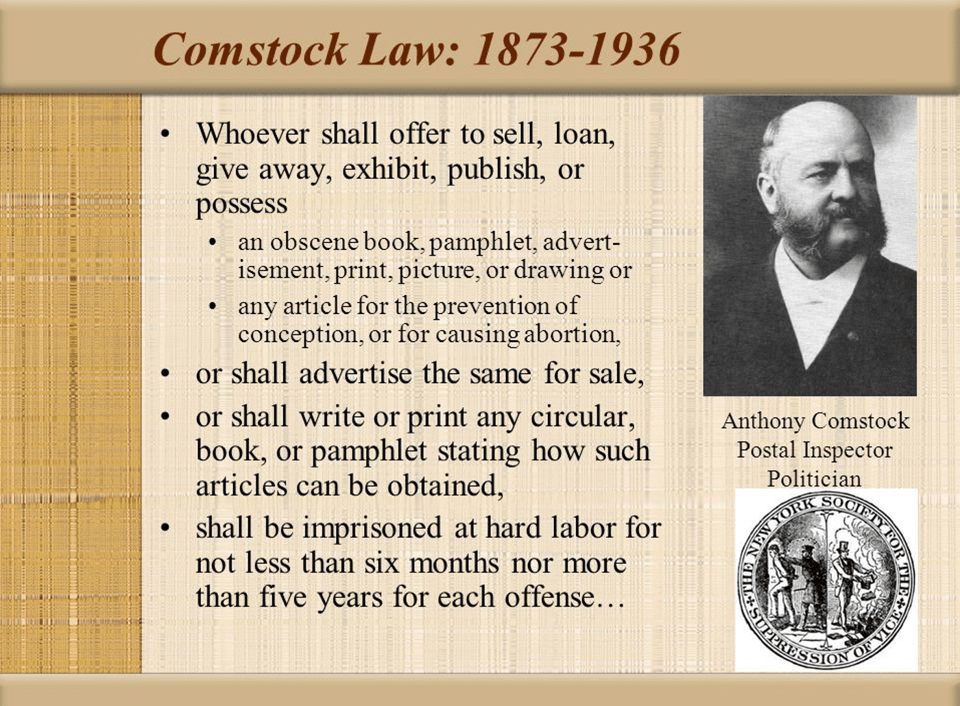
A long discredited, arcane 150-year-old law is back in the news in 2024, and that should terrify anyone who supports reproductive freedom. Last week at the Supreme Court, the Comstock Act of 1873 was referenced on three separate occasions during oral arguments in a case dealing with access to mifepristone, one of two drugs typically used in medication abortions.
Anti-abortion activists like to bring up the Comstock Act because one of its clauses prohibits sending through the mail “every article, instrument, substance, drug, medicine or thing” that could possibly lead to an abortion. Even if the Supreme Court doesn’t take the bait, a newly re-elected President Trump could order his Department of Justice to start interpreting that line to mean that it is illegal to mail mifepristone — a safe, effective, Food and Drug Administration-approved drug — to doctors and pharmacies, as well as to patients directly. The same could go for medical supplies that are used in performing surgical abortions. That could effectively make abortion impossible to access even in places like Minnesota, which has affirmatively protected a woman’s right to choose by passing reproductive freedom laws.
In response, I’m prepared to fight back — including by introducing legislation to take away the Comstock Act as a tool to limit reproductive freedom.
Let me take a step back and explain how ridiculous it is that we’re even talking about this legislative relic today. The Comstock Act hasn’t been broadly enforced since the 1930s. The Biden administration considers it utterly irrelevant. Many legal experts consider it dead letter law. And once you know its back story, it becomes clear why no one has paid much attention to it in nearly a century.
Back in the 1860s, a former Civil War soldier from rural Connecticut named Anthony Comstock moved to New York City for work. He was shocked and appalled by what he found. Advertisements for contraception! Open discussions of sexual health! It all struck Comstock as terribly lewd and anti-Christian.
So he made it his mission to clean up society, creating the loftily named New York Society for the Suppression of Vice and gathering evidence for police raids on places that distributed material he thought was obscene or promoted indecent living. In the early 1870s he took his crusade to Washington, lobbying for federal legislation that would empower the post office to search for and seize anything in the mail that met Comstock’s criteria for being “obscene,” “lewd” or just plain “filthy.” Morality, as determined by Comstock, would be the law of the land, and Comstock himself would be its enforcer, appointed by Congress as a special agent of the post office.
In a fit of Victorian puritanism, Congress passed the Comstock Act into law. But it quickly became apparent that Comstock’s criteria were unworkably vague. In its broad wording, the law not only made it illegal to send pornography through the mail, it also outlawed the sending of medical textbooks for their depictions of the human body, personal love letters that hinted at physical as well as romantic relationships, and even news stories.
The whole thing was very silly and impracticable, and that’s why the Comstock Act was relegated to the dustbin of history.
But conservative activists recently revived it from obscurity as part of their playbook for a potential second Trump term: The 887-page plan nicknamed Project 2025 being promoted by groups like the Heritage Foundation explicitly calls for a newly elected second-term President Trump to use this zombie law to severely ratchet back abortion access in America without congressional action.
Legislation to repeal Comstock could take many forms, and we need to do it the right way. That’s why I’ve begun reaching out to my colleagues in the House of Representatives and the Senate to build support and see what legislation to repeal the Comstock Act might look like. Anti-abortion extremists will continue to exploit any avenue they can find to get the national ban they champion, and I want to make sure my bill shuts down every one of those avenues. Once the Supreme Court has had its say (and many legal analysts speculate that the mifepristone case heard last week should be thrown out on procedural grounds, and may well be), I’ll be ready to have mine.
Here’s the bottom line: We can’t let anyone — not the Supreme Court, not Donald Trump and certainly not a random busybody from the 19th century — take away Americans’ right to access medication abortion. We must protect the ability of doctors, pharmacies and patients to receive in the mail the supplies they need to exercise their right to reproductive care.
As the only former Planned Parenthood executive serving in the Senate, I feel I have a special responsibility to protect not just abortion rights but also abortion access.
Very few Republicans will admit to wanting to see a total, no-exceptions ban on abortion in all 50 states, but the Comstock Act could allow them to achieve that in effect, if not in so many words.
Americans deserve better. The Constitution demands better. And common sense dictates that we stop this outrageous backdoor ploy to eliminate abortion access in its tracks. (New York Times)
____________________________________________
In the Villages, Senior Community in Florida.

Billboard.
Did ya hear? We got the “TRUMP will gut your SOCIAL SECURITY” billboard approved to go up near THE VILLAGES in Florida! Just down Rt 441 between Leesburg and Tavares. Chip in a little if you can. https://t.co/tLqBQPT6ep pic.twitter.com/3omnbs3jpk
— Claude Taylor (@TrueFactsStated) April 3, 2024
Ouch !!! The Villages ???
— Kentucky Spirits 🇺🇦 🥃 (@KentuckySpirits) April 3, 2024
That's gonna leave a mark. The billboards may not convince the residents to vote for Biden, but it will certainly convince some of them to stay home and not vote for the man who wants to take their SS away.
____________________________________________
More GOP speak out against Trump.
Karl Rove spoke out against Trump’s “thugs” from January 6th.
Watch one Republican telling the truth.👇
HOLY SHIT, Republican Karl Rove BLASTED trump and his seditious January 6th thugs.
— BrooklynDad_Defiant!☮️ (@mmpadellan) April 3, 2024
"Every one of those sons of bitches who did that, we ought to find them, try them, and send them to jail." pic.twitter.com/hCFSqNNFA9
Watch a second one. 👇 John Bolton.
‘Many of Bolton’s answers throughout the interview portray Trump as an uninformed, self-centered, easily distracted child who is either unwilling or unable to comprehend government operations and national security.’
— Acyn (@Acyn) April 3, 2024
More: https://t.co/MgNhHsQdws
____________________________________________
This 👇 should lift your spirit.
Republicans Who Voted Against Trump Tonight in Primary Even Though He Was Unopposed:
— Ron Filipkowski (@RonFilipkowski) April 3, 2024
CT - 23%
WI - 22%
NY - 21%
____________________________________________
The Judges in Trump’s cases.
The New York Hush Money case.
Trump sought more delays, this time for an immunity claim. He asked the judge to push back his Manhattan criminal trial, slated to begin April 15, until after the Supreme Court decides whether he is immune from prosecution.The Judge declined.
Judge Merchan said that Trump’s motion is denied as untimely.
“The court finds that the defendant has myriad opportunities to raise the claim of presidential immunity well before March 7, 2024”—the date when Trump filed his immunity motion.
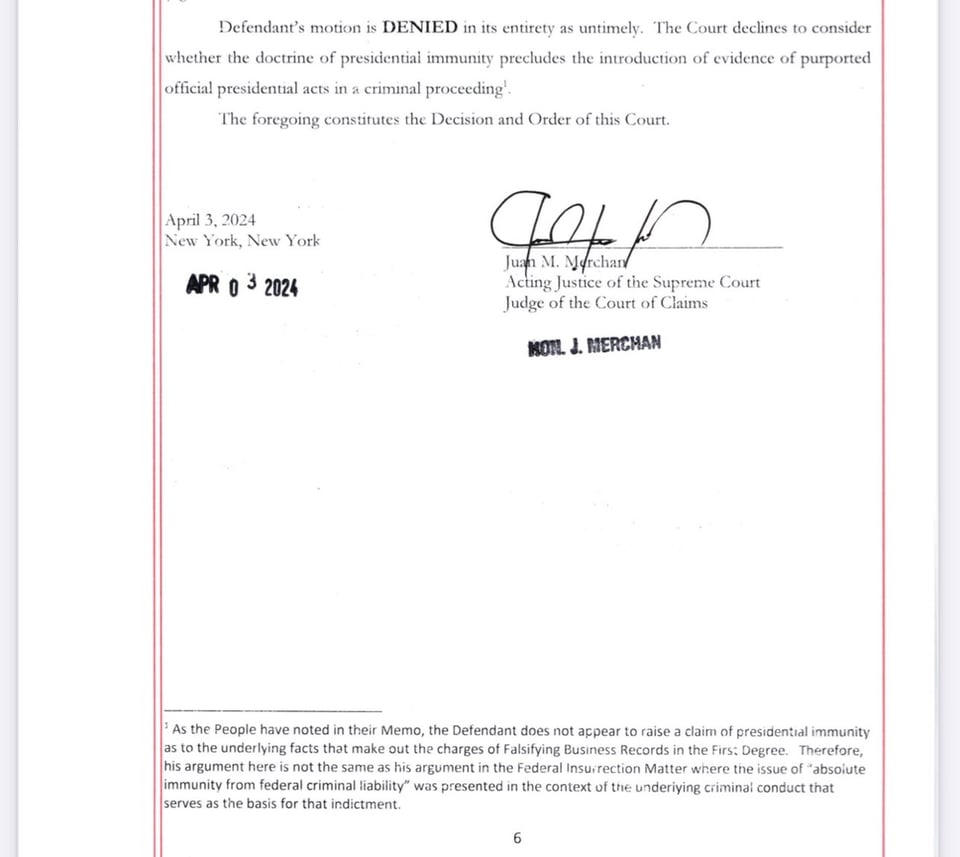
The Classified Documents Case.
Opinion: Why Judge Aileen Cannon is on thin ice in Trump’s Mar-a-Lago case.

Editor’s Note: Norman Eisen, who served as counsel to House Democrats in the first Trump impeachment, is a senior fellow at Brookings. E. Danya Perry, a founding partner of Perry Guha LLP, formerly served as a federal prosecutor and chief of investigations for New York State’s Moreland Commission on Public Corruption. Joshua Kolb served as law clerk for the Senate Judiciary Committee. The views expressed in this commentary are their own. CNN.
CNN —
On Tuesday, special counsel Jack Smith threw down the gauntlet in an extraordinary filing in the Mar-a-Lago prosecution, the case that centers around former President Donald Trump’s retention of classified documents and his resistance to government attempts to recover them from his Mar-a-Lago estate.
Smith warned Judge Aileen Cannon that her approach to the law governing the handling of presidential records — and so Donald Trump’s culpability in the case — was “fundamentally flawed” and threatened to seek rare pretrial review by the 11th US Circuit of Appeals. (Trump denies all wrongdoing.)
Cannon is headed for the most trouble she has faced since that 11th Circuit reversed her twice in her original meddling in the government’s pre-indictment investigation. If she does not course-correct, she’s headed for another shellacking by the circuit – and possible removal from the case.
As a threshold matter we should be clear that there are alternative explanations for her pattern of decisions favoring Trump at the expense of the law.
Some analysts believe she is acting out of bias for a president who appointed her. But she had a good reputation before this case and we cannot rule out other explanations for her bending over backwards (and bending the law) to appear fair to Trump.
But whatever the explanation, the fresh threat from Smith came after she got herself into a tangle when she ordered the parties to propose two versions of instructions for a jury on how to apply the Presidential Records Act (PRA) when the case goes to trial. That statute outlines the parameters between a president’s official and personal records, and sets up processes for how official documents are preserved.
Cannon provided the parties with two scenarios for the divergent jury instructions that assumed legal conclusions about the PRA while simultaneously indicating that she had not made up her mind about which interpretation to apply and reserved the right to entertain counterarguments. She then asked both sides to fashion jury instructions based upon these two imaginary worlds.
We have never seen anything like this before in our collective half-century of legal practice. Judges are supposed to decide the law and to order parties accordingly, not invent fanciful alternative realities for everyone to react to.
Putting that to the side, though, as Smith’s new response makes crystal clear, Cannon’s order suffered from an even more fundamental problem: Both options rest on badly misconceived assumptions about the law.
Cannon’s first scenario would allow the jury to make a factual determination about whether a former president deemed a record to be personal or official under the PRA. That is nonsensical – presidents are not allowed to designate official records as personal ones, so there is no factual issue for a jury to resolve.
A different set of laws govern the classification process and the rules for handling highly sensitive classified documents — not the PRA. They include Executive Order 13526. One of the authors of this column (Eisen) helped write that executive order. The 11th Circuit has already established that those rules fully apply to former presidents.
Cannon seems to think that the PRA somehow supersedes the executive order and the rest of federal law pertaining to the handling of classified materials. It does not. On the contrary, the PRA defines “personal records” as “all documentary materials … of a purely private or nonpublic character which do not relate to or have an effect upon the carrying out of the constitutional, statutory, or other official or ceremonial duties of the President.” That cannot possibly include highly classified battle plans, nuclear secrets and the other official documents at issue in this criminal prosecution.
That rules out Cannon’s first hypothetical. But as Smith points out in his filing, the second alternative is just as bad. She made up a legal standard, asking both sides to assume that Trump could have deemed a record personal by simply not including it with the records transmitted to the National Archives and Records Administration at the end of his term. If this were true, the mere fact that Trump took the documents with him from the White House would inherently turn them into personal records.
Of course, Trump leaped at this interpretation, fashioning proposed jury instructionsthat would inevitably result in his acquittal. But, as Smith noted, this approach has no basis in the law — or the facts. Even Trump himself does not seem to have considered classified documents personal after he left the White House, as evidenced in an audio recording CNN obtained last year in which Trump, during a conversation at his Bedminster, New Jersey, estate in 2021, discussed documents remaining classified even though he took them with him upon leaving office. Smith hits this point hard, arguing that Trump’s position that records are personal was “invented” when the controversy over the documents began to emerge in February 2022, over a year after Trump left the White House.
Importantly, Smith asked Cannon to let both parties know “promptly” how she viewed the law. If she ultimately embraces the legal interpretation articulated in her proposed scenarios, Smith indicated he would strongly consider immediate appellate review. That shows how seriously Smith views this issue and the fundamental error Cannon would be making. (CNN)
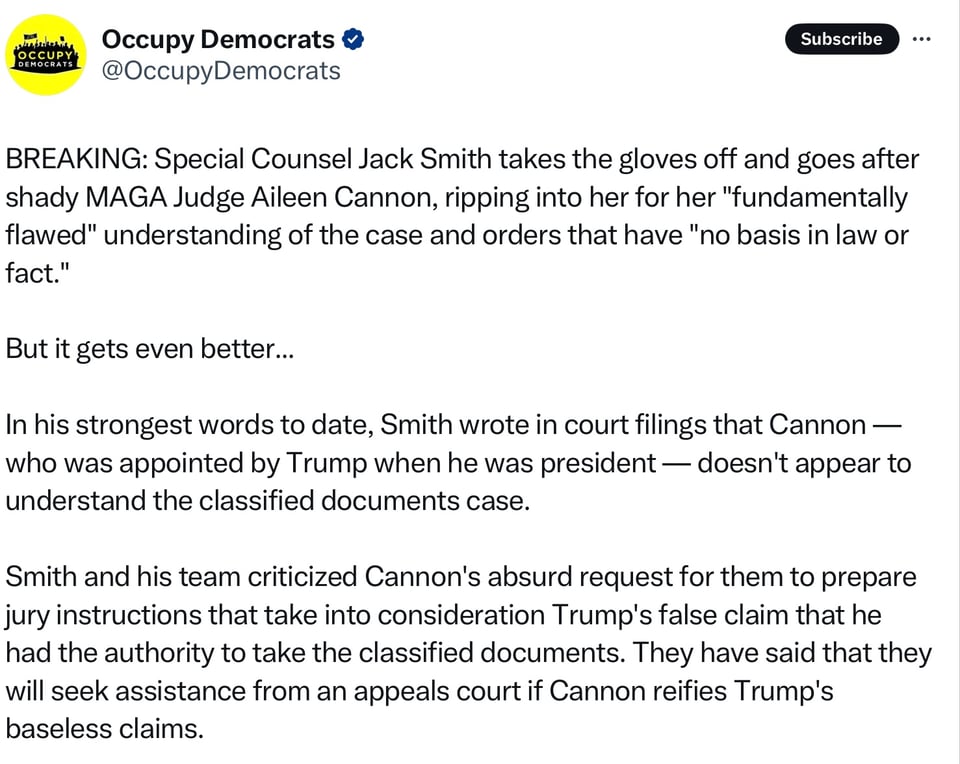
____________________________________________
Getting ready for the eclipse on Monday.

The solar eclipse is upon us! In NYC, the eclipse begins at 2:10pm, reaches maximum at 3:25pm, and ends at 4:26pm. Here are NYC events on Monday: https://www.timeout.com/newyork/things-to-do/the-best-solar-eclipse-2024-events-in-nyc It's the last total eclipse for 25 years, and the last one in NY State until 2075, so look up (with those special glasses, of course)! 😎 (Source: Upper West Side Yoga and Fitness).
